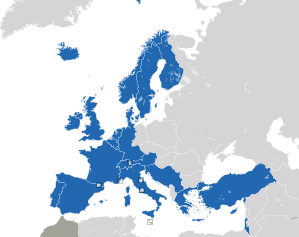Eurovision Song Contest 1989
The winner was Yugoslavia with the song "Rock Me", composed by Rajko Dujmić, written by Stevo Cvikić and performed by the group Riva.[4] Over a dozen cities were reported to have applied to host the contest, with Lausanne winning out due to its combination of a suitable production venue, logistical infrastructure availability, and proximity to an international airport.[8][9] Additionally, Søren Bundgaard who had represented Denmark in three previous editions of the contest as a member of the duo Hot Eyes, was one of Birthe Kjær's backing performers in this year's event.[12] The 1989 contest featured the youngest ever lead performers, in the form of 12-year-old Gili Netanel [he] and 11-year-old Nathalie Pâque representing Israel and France respectively.[20][25][26] The logo, designed by Fritz Aeschbach, is a representation of the Matterhorn created with computer graphics, constructed using contour lines to represent the strings of a guitar, and featuring a silhouette outline of Lausanne Cathedral at the base.[2][28][29] Delegations were also invited to a number of special events during the contest week: on 1 May a welcome reception was hosted by the Council of States of the canton of Vaud and the municipality of Lausanne in the ballroom of the Palais de Beaulieu; on 2 May, Céline Dion performed her first show on Swiss soil as part of her Incognito Tour at the Théâtre de Beaulieu; a dinner cruise on Lake Geneva was organised for 3 May; and a reception on 5 May was organsised by the tourist office of the canton of Grisons.[36] The points awarded by each country were determined by an assembled jury of sixteen individuals, who were all required to be members of the public with no connection to the music industry, split evenly between men and women and by age.In any cases where two or more songs in the top ten received the same number of votes, a show of hands by all jury members was used to determine the final placing.[37][38] Partly due to the close result at the previous year's event, the tie-break procedure, to determine a single winner should two or more countries finish in first place with the same number of points, was modified.[43] The winner was Yugoslavia represented by the song "Rock Me", composed by Rajko Dujmić, written by Stevo Cvikić and performed by the band Riva.[12][45] It would also prove to be the country's only win, as the nation would begin to break into separate states two years later and would eventually participate for the last time in 1992.[34] Broadcasters were able to send commentators to provide coverage of the contest in their own native language and to relay information about the artists and songs to their television viewers.



Palais de BeaulieuJacques DeschenauxLolita MorenaSwiss Broadcasting CorporationTélévision suisse romandeCyprusYugoslaviaRock MeEurovision Song ContestLausanneEuropean Broadcasting Union1988 contestNe partez pas sans moiCéline DionNathalie PâqueIsraelFrancefollowing year's contestRajko DujmićUnited KingdomDenmarkSwedenAustriaFinlandIrelandIcelandnul pointsinaugural editionLuganoLys AssiaList of countries in the Eurovision Song ContestBelgiumGermanyGreeceLuxembourgNetherlandsNorwayPortugalSwitzerlandTurkeyUnited KingdomRomanshfour national languagesJustine PelmelayGerard JolingMariannaSøren BundgaardHot EyesBirthe KjærGermanAustrianDieter BohlenJoachim Horn-Bernges1990 contestThomas ForstnerIngeborgStef BosVi maler byen rødDanishKeld HeickAnneli SaaristoFinnishOssi RunneAntenne 2FrenchNino de AngeloMarianna EfstratiouDaníelIcelandicKiev ConnollyNoel KelehanHebrewAnna OxaFausto LealiItalianFranco FasanoPark CaféMaggie ParkeGast WaltzingCees BergmanGeertjan HessingAart MolErwin van PrehmElmer VeerfoffHarry van HoofBritt Synnøve JohansenNorwegianDa VinciPortuguesePedro LuísNacida para amarSpanishJuan Carlos CalderónTommy NilssonSwedishAlexander BardOla HåkanssonTim NorellAnders BerglundSRG SSRFurbazTurkishTimur SelçukLive ReportWhy Do I Always Get It WrongRonnie HazlehurstSerbo-CroatianconductscrutineerMorgesLa CôteMatterhorncomputer graphicscontour linesstringsguitarLausanne CathedralMiss Switzerland 1982Council of StatescantonIncognito TourThéâtre de Beaulieudinner cruiseGrisonsbacking tracksmimed by the performers